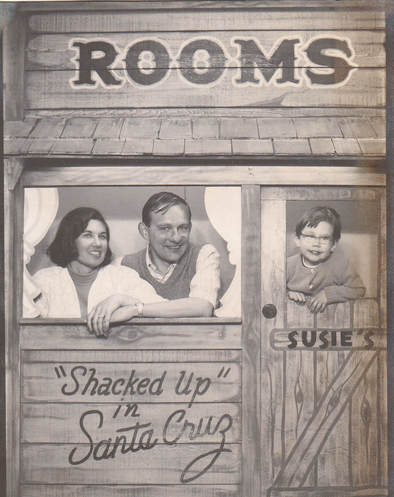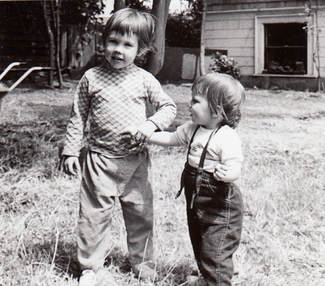 Perfect for a Santa Cruz Commune?
Perfect for a Santa Cruz Commune? New ideas and attitudes erupted across the globe, especially among young people, as the nineteen-sixties catapulted to their noisy end—ideas about justice and what made a good life. These ideas, of course, had been lurking around before, but now they were pushing out of the shadows, brazen and insistent. In Berkeley, Sherrill and I were at the first "teach-in" about the Vietnam War, where Norman Mailer, Alan Watts, and Dick Gregory, among others, spoke. Dr. Spock, whose book we were using to raise baby Simone, gave an impassioned appeal for salvaging the future for these and coming generations.
The musical Hair brought these issues plus a new inclusive approach to society to a wider audience. When we drove through Toronto on our way to Expo 67, college students saw our Berkeley stickers and cheered. The good life, it seemed, was not all about money.
Serious questions were in the air, like philosophical pollen. Sherrill and I, not kids any more, began looking at who we were and what our family of three needed. Part of this search included getting together with other families to look into the idea of communal living. Our informal group met for what turned out to be more than two years. A lot of reading, a lot of pondering, and a lot of talking were involved.
Usually, we met in each other's homes, but on occasion some of us went further afield to explore places where we might settle, live, and raise families. Mendocino on the north coast was a possibility, but so was the area around Santa Cruz on the central coast, as were parts of Oregon. Sometimes, it seemed as if we were following the course of the nineteenth century settlers who came west looking for the good life. We debated whether we wanted an urban commune or a rural one. Discussions about this and other questions could expand into hours or weeks and still not be resolved. We were better at debate, it seemed, than at consensus.
"How can we live without the cultural advantages of the city—for ourselves and our kids?"
"They may not live at all unless we get them away from these violent cities."
Okay, we didn't always agree, but we had no doubt that our talents and skills would work together to create a new paradise on this shaky coast. Some of us were experienced at organization, others at carpentry or gardening, some at child care and education. Some wanted to plunge ahead, confident that problems would work themselves out; others thought that details should be settled first. One lesson we learned through all this was that people aren't consistent or easy to drop into boxes, but you can be pretty sure that their personal quirks are unlikely to change.
One Saturday morning, Sherrill, Simone, and I set out with another family to spend a couple of days together in the redwoods. Very cleverly, we divided up in two cars: the two wives in one car with the food, the other husband and I in the second car with the children. Guess who got lost? Eventually, we two guys managed to find the cabins and our wives, but we had some hungry little kids by the time we all settled down to eat.
"Why a commune?" people asked us, a question that we often still discussed when we got together—and, even more important, why did the idea appeal to each of us? Some reasons were practical. In a commune, we could share household expenses and responsibilities. Whether we lived in one large house or several smaller houses grouped together, we'd only need one vacuum, one washing machine and dryer, fewer pots and pans. We could take turns preparing meals, cleaning house, working in the garden, caring for children. We probably wouldn't need as many cars, so that would be good for the environment, as well as save money. Some of us might work outside the commune, bringing in money, others might contribute by working only in the commune. We had that part more or less worked out.
Other reasons for being part of a commune were more varied and personal. Two of the children in our group had no siblings; if we all lived together, the children would grow up like brothers and sisters. Sherrill admitted to everyone during one of our meetings that when she was a child most of the time she wasn't part of anything that could be called a nuclear family. Often, she was alone with her mother, although for a while also with a stepfather and stepbrother, sometimes with her grandmother or other relatives, sometimes mostly taking care of herself. A commune, she hoped, would be a stable family for all of us, sharing everything, taking care of each other.
We didn't spend all of our time talking, although looking back it often seems as if we did. We made serious efforts to develop practical ways we could support a commune. For a while, we planned opening a nursery school. As a children's librarian who worked with school children in both public schools and the library, Sherrill had an up-to-date teaching credential. Others of us would bring musical, artistic, and other practical skills to the mix. Then it turned out that the place where we hoped to open the school couldn't be changed enough to pass safety inspections.
We knew that we weren't the only people exploring ideas about communal living. We corresponded with active communes in other parts of the country and from time to time families and individuals dropped by to find out if we all were heading in the same direction. Occasionally, they stayed for a while, but then for their own reasons moved on.
We never did pull ourselves together into a working commune. Maybe we were too busy studying the options and talking about them to follow through. After a couple of years, we brought in a facilitator to help us work out with a 24-hour encounter group any issues we might have had. Encounter groups were a popular concept then. I seem to recall spending most of ours under a coffee table.
Whatever the reasons that the commune didn't succeed, the time wasn't wasted. Along the way, we each discovered the kind of life that suited us as individuals and as families and made life-long friends—as did our young children, who, years later, have adult or soon to be adult children of their own.
To be continued....

 RSS Feed
RSS Feed